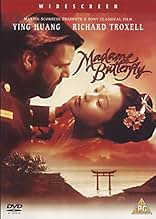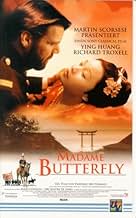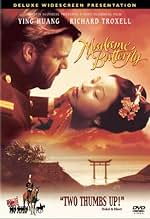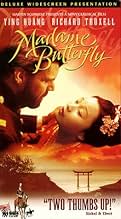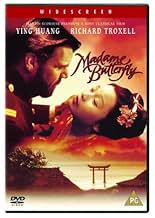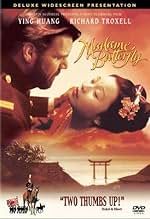The story of a young geisha who falls madly in love with an american captain that travels all around the world collecting hearts.The story of a young geisha who falls madly in love with an american captain that travels all around the world collecting hearts.The story of a young geisha who falls madly in love with an american captain that travels all around the world collecting hearts.
- Director
- Writers
- Stars
- Awards
- 1 win & 1 nomination total
- Director
- Writers
- All cast & crew
- Production, box office & more at IMDbPro
Featured reviews
The first time I saw Madama Butterfly was early August 2020, as a 2017 performance at the Royal Opera House. I loved the music so much I decided to watch this version as well. This movie has taken a realist approach to depicting the story by Asian singers for the Asian roles. This choice was slightly at the cost of operatic quality, but if for the sake for top-notch voices the cast had been whitewashed and replaced by singers twice as old, I would have skipped it. This is a movie, not a live performance.
Ying Huang (Cio-cio-san/Butterfly) played the affection-starved yet goodhearted woman beautifully, if not a little stiffly at times. Richard Troxell (Pinkerton, the American naval officer) played the entitled "playboy" so convincingly I had the urge to slap him through the screen. Jingma Fan (Goro) played the marriage broker; in this version he's not only oppertunistic but also slightly malicious which was surprising but Fan played it well.
The visuals in this movie were unexpectedly beautiful. Instead of depicting the bustling harbour city of Nagasaki they chose a more rural setting with thatched houses; as it was shot in Tunisia the village is dotted with olive trees rather than pine trees. This was probably done for economic reasons, yet it never feels fake: the houses look real and lively, the gardens are lined with flowers, people are fishing for mussels in the surf. The costumes and interiors were pretty as well.
However, I think the director took too many artistic liberties. By inserting flashbacks and flash-forwards and making it appear as if days or even weeks pass between different events he interrupted the pacing of the music. He also left out about 10 minutes of music at the beginning of Act 3 ("Oh Eh ! Oh Eh !") The cinematography was pretty during shots of landscapes and outside scenes, but during interior scenes the mostly static shots tended to make the rooms look cramped.
Despite good singers and beautiful set design, its shortcomings on both the cinematic and operatic side make this film fall short of being great. However, it is still good and I can recommend this to everyone.
Ying Huang (Cio-cio-san/Butterfly) played the affection-starved yet goodhearted woman beautifully, if not a little stiffly at times. Richard Troxell (Pinkerton, the American naval officer) played the entitled "playboy" so convincingly I had the urge to slap him through the screen. Jingma Fan (Goro) played the marriage broker; in this version he's not only oppertunistic but also slightly malicious which was surprising but Fan played it well.
The visuals in this movie were unexpectedly beautiful. Instead of depicting the bustling harbour city of Nagasaki they chose a more rural setting with thatched houses; as it was shot in Tunisia the village is dotted with olive trees rather than pine trees. This was probably done for economic reasons, yet it never feels fake: the houses look real and lively, the gardens are lined with flowers, people are fishing for mussels in the surf. The costumes and interiors were pretty as well.
However, I think the director took too many artistic liberties. By inserting flashbacks and flash-forwards and making it appear as if days or even weeks pass between different events he interrupted the pacing of the music. He also left out about 10 minutes of music at the beginning of Act 3 ("Oh Eh ! Oh Eh !") The cinematography was pretty during shots of landscapes and outside scenes, but during interior scenes the mostly static shots tended to make the rooms look cramped.
Despite good singers and beautiful set design, its shortcomings on both the cinematic and operatic side make this film fall short of being great. However, it is still good and I can recommend this to everyone.
In early August I saw this opera for the first time as a 2017 performance at the Royal Opera House, and I loved the music so much I decided to watch this version as well. What makes this movie stand out is the decision to cast Asian actors and actresses for the Asian roles.
Ying Huang (Cio-cio-san/Butterfly) played the affection-starved yet goodhearted woman beautifully. Richard Troxell (Pinkerton, the American naval officer) played the entitled "playboy" so convincingly I had the urge to slap him through the screen. Jingma Fan (Goro) played the marriage broker; in this version he's not only oppertunistic but also slightly malicious which was surprising but Fan played it well.
The visuals in this movie were unexpectedly beautiful. Instead of depicting the bustling harbour city of Nagasaki they chose a more rural setting with thatched houses; as it was shot "on location" in Tunisia the village is dotted with olive trees rather than pine trees. This was probably done for economic reasons, yet it doesn't feel fake for a moment: the houses look real and lively, the gardens are lined with flowers, people are fishing for mussels in the surf. The costumes and interiors were pretty as well. The cinematography was a bit clunky at times (especially in Act 3) which admittedly bothered me more than it should have.
However, I feel the director took too many artistic liberties. By inserting flashbacks and flash-forwards and making it appear as if days or even months pass between different musical pieces he interrupted the pacing of the music. He also left out a good 10 minutes of music at the beginning of Act 3 ("Oh Eh ! Oh Eh !")
Despite some flaws on the director's part, this still makes for a good movie with good casting, beautiful casting and beautiful visuals. I can recommend this movie to everyone, even the people who don't like opera.
Ying Huang (Cio-cio-san/Butterfly) played the affection-starved yet goodhearted woman beautifully. Richard Troxell (Pinkerton, the American naval officer) played the entitled "playboy" so convincingly I had the urge to slap him through the screen. Jingma Fan (Goro) played the marriage broker; in this version he's not only oppertunistic but also slightly malicious which was surprising but Fan played it well.
The visuals in this movie were unexpectedly beautiful. Instead of depicting the bustling harbour city of Nagasaki they chose a more rural setting with thatched houses; as it was shot "on location" in Tunisia the village is dotted with olive trees rather than pine trees. This was probably done for economic reasons, yet it doesn't feel fake for a moment: the houses look real and lively, the gardens are lined with flowers, people are fishing for mussels in the surf. The costumes and interiors were pretty as well. The cinematography was a bit clunky at times (especially in Act 3) which admittedly bothered me more than it should have.
However, I feel the director took too many artistic liberties. By inserting flashbacks and flash-forwards and making it appear as if days or even months pass between different musical pieces he interrupted the pacing of the music. He also left out a good 10 minutes of music at the beginning of Act 3 ("Oh Eh ! Oh Eh !")
Despite some flaws on the director's part, this still makes for a good movie with good casting, beautiful casting and beautiful visuals. I can recommend this movie to everyone, even the people who don't like opera.
This gorgeously shot and brilliantly directed film version of the opera is the most passionate I've seen. The acting is unusually detailed and truthful for an opera, especially Butterfly's total commitment and Pinkerton's breezy lust.
But why didn't we see his ship sail into the bay? The water and mountains seemed destined for that shot, but didn't deliver. The boy was too old, the voice of the "uncle" in the sky didn't work, but generally it was a deeply moving experience, rising to a terrific climax in her suicide and his remorse. That last closeup of Pinkerton, racked by remorse, lifting the dying Butterfly, was powerful. The film aired in Canada on Aug 8 on the Bravo! TV network. I couldn't tear myself away to get to a party till the final credits were rolling.
But why didn't we see his ship sail into the bay? The water and mountains seemed destined for that shot, but didn't deliver. The boy was too old, the voice of the "uncle" in the sky didn't work, but generally it was a deeply moving experience, rising to a terrific climax in her suicide and his remorse. That last closeup of Pinkerton, racked by remorse, lifting the dying Butterfly, was powerful. The film aired in Canada on Aug 8 on the Bravo! TV network. I couldn't tear myself away to get to a party till the final credits were rolling.
Madame Butterfly is a beautiful, romantic and dramatic story. It is all about a fifteen years old geisha called Cio Cio-San, who gets married with the official of the American navy, Benjamim Franklin Pinkerton.
Pinkerton, the fiancé, is just buying a woman, as he did in other parts of the world, to be close in his moments of loneliness, while he doesn't marry a true American wife.
After three years of marriage, Pinkerton goes back to the United States, leaving Butterfly with a small son he never knew. Cio Cio San believes that her husband will return, and she refuses to assume her Japanese values and a new life.
During all the story, Cio Cio-San will always count with the unconditional friendship of the maid Suzuki.
To get things worst, Butterfly receives a letter of Pinkerton informing that he will not return anymore, making clear that he married an American woman. Butterfly interprets his words in an erroneous way, and she sees new hopes for of her husband arrival.
He returns, however, to look for his son.
The end of the plot shows the suicide of Butterfly, when noticing that she had lost everything that she loved, the husband and now also the son. (She had used as a weapon her father's sword, with the inscription: "To die with honor, when one can no longer live with honor". The now-humiliated, heartbroken daughter of a disgraced samurai, she dies proudly - as a samurai.)
The opera is tragic, because Cio Cio-San really believes in her illusions, and she only notices the mistakes very late.
There are difficulties, for example, how she was renounced by her relatives by converting Pinkerton's religion (Catholicism), or her son, that came to this world, only after the American had already left.
The history is full of cultural contrasts, since the story is in the Japan of the beginning of XX century, where the prejudices were worst.
The reason whyI liked this movie so much : in my opinion, it is the best Madame Butterfly I have ever seen in a movie. I was surprised to see that the movie is all sang in opera terms. Many people might not like that.
The sets are beautiful, and the movie was made full of details, to really show the Japanese habits, thoughts and life style.
Frédéric Mitterrand had even the concern of choosing Asian actors to play in the cast, much better then Jean Pierre-Ponnele's version, where all of the actors are westerns.
Pinkerton, the fiancé, is just buying a woman, as he did in other parts of the world, to be close in his moments of loneliness, while he doesn't marry a true American wife.
After three years of marriage, Pinkerton goes back to the United States, leaving Butterfly with a small son he never knew. Cio Cio San believes that her husband will return, and she refuses to assume her Japanese values and a new life.
During all the story, Cio Cio-San will always count with the unconditional friendship of the maid Suzuki.
To get things worst, Butterfly receives a letter of Pinkerton informing that he will not return anymore, making clear that he married an American woman. Butterfly interprets his words in an erroneous way, and she sees new hopes for of her husband arrival.
He returns, however, to look for his son.
The end of the plot shows the suicide of Butterfly, when noticing that she had lost everything that she loved, the husband and now also the son. (She had used as a weapon her father's sword, with the inscription: "To die with honor, when one can no longer live with honor". The now-humiliated, heartbroken daughter of a disgraced samurai, she dies proudly - as a samurai.)
The opera is tragic, because Cio Cio-San really believes in her illusions, and she only notices the mistakes very late.
There are difficulties, for example, how she was renounced by her relatives by converting Pinkerton's religion (Catholicism), or her son, that came to this world, only after the American had already left.
The history is full of cultural contrasts, since the story is in the Japan of the beginning of XX century, where the prejudices were worst.
The reason whyI liked this movie so much : in my opinion, it is the best Madame Butterfly I have ever seen in a movie. I was surprised to see that the movie is all sang in opera terms. Many people might not like that.
The sets are beautiful, and the movie was made full of details, to really show the Japanese habits, thoughts and life style.
Frédéric Mitterrand had even the concern of choosing Asian actors to play in the cast, much better then Jean Pierre-Ponnele's version, where all of the actors are westerns.
Unfortunatly , their lips aren't moving right. So their either lip synching or it's been dubbed. Richard Troxell's the best in this. His emotion drips off the screen. So's his cohort. The actress playing butterfly looks and acts too old for the part. I personally loved this film. But as they are singing in opera terms, many might not appreciate it. It's up to you. (example: I found it to be uplifting and another person found it to be more depressing than The Refelecting Skin.) So what you take from it is entirely up to you. :)
9/10 (can't give it a full 10 because of the dubbing/lip synch problems.
Quality: 9/10 Entertainment: 10/10 (how can you not. with such powerful singing) Replayable: 6/10
9/10 (can't give it a full 10 because of the dubbing/lip synch problems.
Quality: 9/10 Entertainment: 10/10 (how can you not. with such powerful singing) Replayable: 6/10
Did you know
- TriviaThe entire Japanese village set and house were built in Tunisia, Northern Africa.
- GoofsDuring Act 2 and Act 3, a blooming wisteria is shown to be growing along the house's roof above the porch. In reality wisteria would not have been grown here as the house's structure would have been unsuitable for it. Wisteria is a plant known to become heavy and massive with age; it would have been grown along a sturdy trellis or stone wall instead as not to cause any damage.
- Quotes
Lieutenant Benjamin Franklin Pinkerton: She's like a porcelain doll. She sets me on fire.
- How long is Madame Butterfly?Powered by Alexa
Details
- Release date
- Countries of origin
- Language
- Also known as
- Madame Butterfly, de Frederick Mitterand
- Filming locations
- Production companies
- See more company credits at IMDbPro
Box office
- Gross US & Canada
- $65,196
- Opening weekend US & Canada
- $6,027
- May 5, 1996
- Gross worldwide
- $65,196
Contribute to this page
Suggest an edit or add missing content

